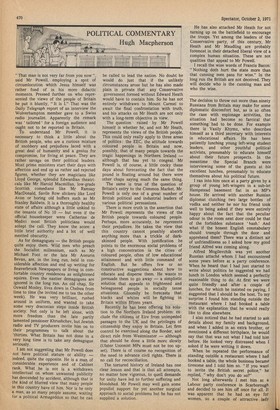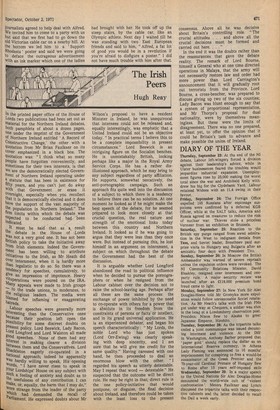POLITICAL COMMENTARY Hugh Macpherson
"That man is not very far from you now ", said Mr Powell, employing a spot of circumlocution which Jesus himself was rather fond of in his more didactic moments. Pressed further on who represented the views of the people of Britain he put it bluntly, "It is I." That was the Dciily Telegraph report of an interview the Wolverhampton member gave to a Swiss radio journalist. Apparently the remark was ' tailored ' for a foreign audience and ought not to be reported in Britain. To understand Mr Powell, it is necessary to think a little about the British people, who are a curious mixture of snobbery and prejudices laced with a great deal of humanity and a genius for compromise, for living at peace. They are rather savage on their political leaders. Most prime ministers start their days with affection and end up as rather sad rejected figures, whether they are magicians like Lloyd George, splendid Edwardian theatricals like Mr Harold Macmillan, low-grade Scottish comedians like Mr Ramsay MacDonald, Savile Row slickers like Lord Avon or boring old buffers such as Mr Stanley Baldwin. It is a thoroughly healthy state of affairs although a little unkind to the tenants of No 10 — but even if the official housekeeper were Catherine de Medici most British politicians would accept the call. They know the score: a little brief authority and a lot of well merited obscurity.
As for demagogues — the British people quite enjoy them. Wild men who preach the Socialist millennium, such as Mr Michael Foot or the late Mr Aneurin Bevan, are, in the long run, held in considerable affection and end up writing for Beaverbrook Newspapers or living in comfortable country residences as enlightened squires. Even the nastier demagogues are ignored in the long run. An old chap, Sir Oswald Mosley, lives down in Chelsea from time to time (he invited me to tea the other week). He was very brilliant, rushed around in uniform, and wanted to take some very draconian steps inside British society. Not only is he left alone, with more freedom than the late partly lamented pensioner Khrushchev, but Jewish radio and TV producers invite him on to their programmes to talk about the 'thirties. What Britain has not done in a very long time is to take any demagogue seriously.
I am not suggesting that Mr Powell does not have political stature or ability — indeed, quite the opposite. He is a man of considerable experience and of Cabinet rank. What he is not is a withdrawn intellectual on whom unwanted publicity has descended by accident, although that is the kind of blurred view that many people in this country have of him. Nor is he only a man, as so many people assume, waiting for a political Armageddon so that he can be called to lead the nation. No doubt he would do just that if the unlikely circumstances arose but he has also made plain in private that any Conservative government formed without Edward Heath would have to contain him. So he has not entirely withdrawn to Mount Carmel to await the final confrontation with truth, and his attacks on Mr Heath are not only with a long-term objective in view.
The question raised by Mr Powell himself is whether he, and not Mr Heath, represents the views of the British people. This could only really apply to three areas of politics: the EEC, the attitude towards coloured people in Britain and now, possibly, that of many people towards the tragic happenings in Northern Ireland — although that has yet to congeal. Mr Powell is, of course, a little cocky these days about forecasting the fact that the pound is floating around but there were other chaps saying much the same thing.
The same is true of the question of Britain's entry to the Common Market. Mr. Powell is only one of a great number of British political and industrial leaders of yarious political persuasions.
There is more truth in the assertion that Mr Powell represents the views of the British people towards coloured people. Perhaps, more accurately, he represents their prejudices. He takes the view that this country cannot possibly absorb anything more than a trickle of darkskinned people. With justification he points to the enormous social problems of a high concentration in the cities of coloured people, often of low educational attainment and with little command of English. But he offers few or no constructive suggestions about how to educate and disperse them. He wants to persuade them to go away — a simplistic solution that appeals to frightened and beleaguered people in socially tense situations. Gloomily he forecasts that blacks and whites will be fighting in Britain within fifteen years.
Recently he has been offering his solution to the Northern Ireland problem: exclude the citizens of Eire from unimpeded passages to the UK and the privileges of citizenship they enjoy in Britain. Let firm control be exercised along the Border, and direct rule from Westminster — although that should be done a little more slowly (Ulster Unionist MPs must not be too upset). There is of course no recognition of the need to advance civil rights. There is no call for reconciliation.
The tortured history of Ireland has one clear lesson and that is that all attempts, no matter how vigorous, to quell demands for unity have led to further suffering and bloodshed. Mr Powell may well gain some populist support for yet another surgical approach to social problems but he has not supplied a solution. He has also attacked Mr Heath for not turning up on the battlefield to encourage the troops. Yet among the leaders of the Conservative party, of this century, Mr Heath and Mr Maudling are probably foremost in their detached liberal view of a complex human situation. These are not qualities that appeal to Mr Powell.
I recall the wise words of Francis Bacon: "Nothing doth hurt the state more than that cunning men pass for wise." In the long run the British are not deceived. They will decide who is the cunning man and who the wise.
The decision to throw out more than ninety Russians from Britain may make for some diplomatic discomfort but, as is so often the case with espionage activities, the situation had become so farcical that something had to be done. For example there is Vasily Khymz, who describes himself as a third secretary with interests in educational affairs. He has been patiently lunching young left-wing student leaders, and other youthful political activists, presumably to educate himself about their future prospects. In the meantime the Special Branch were interviewing some of the guests at his excellent lunches, presumably to educate themselves about his political future.
I ran into him once at a party given by a group of young left-wingers in a sub-let Hampstead basement flat in an MP's house. He arrived with another Russian diplomat clutching two large bottles of vodka and neither he nor his friend took well to being asked if they were entirely happy about the fact that the peculiar odour in the room next door could be that of the forbidden substance 'hash.' And what if the honest English constabulary should trample through the door and apprehend them? There was a distinct air of unfriendliness so I asked how my good friend Alfred was coming along.
Alfred Mogilevchik was yet another Russian attaché whom I had encountered some years before at a party conference. When he heard that I had just started to write about politics he suggested we had lunch in London which seemed a perfectly reasonable thing to do. At first we were quite friendly and after a couple of lunches, for which he insisted on paying, I suggested that I should be the host. To my surprise I found him standing outside the restaurant where I had booked a table with the explanation that he would really like to dine elsewhere.
I also noticed that he had started to ask details about my family and background, and when I added in an extra brother, or mentioned a different birthplace, he would say that that was not what I had told him before. He looked very distressed when I asked if he were writing it down.
When he repeated the performance of standing outside a restaurant where I had booked a table, the whole business became tiresome and I told him so. "If you want to invite the British secret police," he replied, "why don't you do so?"
Not long afterwards I met him at a Labour party conference in Scarborough and decided to see him off once for all. It was apparent that he had an eye for women, so a couple of attractive lady journalists agreed to help deal with Alfred. We invited him to come to a party with us but said that we first had to go down the old Victorian cable car on a nearby hill. At the bottom we led him to a ' Support Rhodesia' poster and said we were going to deface the outrageous advertisement With an ink marker which one of the ladies had brought with her. He took off up the steep stairs, by the cable car, like an Olympic athlete. Next day I waited till he was standing with two East European friends and said to him, "Alfred, a fat lot of good you would be in a revolution if you're afraid to disfigure a poster." I did not have much trouble with him after that.

































 Previous page
Previous page